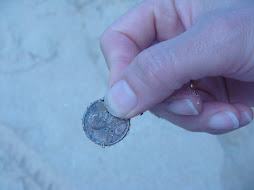Give Up Plastic (and Paper) Bags
Cost: $1
Do you opt for paper or plastic when at the grocery store? Neither is a good choice. Twelve million barrels of oil were used to make the 88.5 billion plastic bags consumed in the United States last year. And it takes four times more energy to make paper bags.
The best choice is reusable shopping bags made of cotton, nylon or durable, meshlike plastic. Put a few reusable shopping bags in your car so you have them handy on your next shopping trip. And if you happen to forget your reusable bag (as we all do!), choose paper if you will recycle it or plastic if you will reuse or recycle it.
Stop Buying Bottled Water
Cost: $14.98 for aluminum water bottle
Did you know that it takes 26 bottles of water to produce the plastic container for a one-liter bottle of water, and that doing so pollutes 25 liters of groundwater? Don’t leave a trail of plastic water bottles in your wake! Stop buying bottled water. Use reusable water bottles instead made from materials like stainless steel or aluminum that are not likely to degrade over time. If you choose a plastic water bottle, check the number on the bottom first: Plastics numbered 3, 6 and 7 could pose a health threat to you, so look for plastics numbered 1, 2, 4 or 5.
Stop Receiving Unwanted Catalogs
Cost: $0
Each year, 19 billion catalogs are mailed to American consumers. All those catalogs require more than 53 million trees and 56 billion gallons of wastewater to produce -- and many of us don't even know how we got on so many mailing lists! So grab that stack of catalogs piling up on your coffee table and clear out the clutter. Visit CatalogChoice.org to put a stop to unwanted catalogs. Within 10 weeks, your mailbox will be empty of unwanted catalogs. A less cluttered mailbox means less pollution, less waste and less of the pollution that cause global warming.
Give Up Conventional Detergents
Cost: $10.25 for one 112-oz box
Many natural detergents today are made to clean clothes just as effectively in cooler water temperatures. Choose detergents and other laundry products that are plant-based, concentrated and biodegradable.
Give Up Hot Water (At Least In the Clothes Washer)
Cost: $0
Did you know that only 10 percent of the energy used by a typical washing machine powers the motor? About 90 percent of the energy is used to heat the water, and most clothes will come clean in cold water. So switch your washing machine's temperature setting. For heavily soiled clothing, change it from hot to warm, but otherwise try to wash and rinse most of your clothing in cold water.
TDG Editor note: In the market for a new washer? Look for an energy-efficient front-loading clothes washer and other green laundry gear.
Cost: $0
The second biggest household energy user, after the refrigerator, is the clothes dryer. Overdrying your clothes can end up costing you money as well. (As much as $70,000 over your lifetime, according to the Green Cheapskate.) An electric dryer operating an extra 15 minutes a load can cost you up to $34 a year in wasted energy; a gas dryer, $21 a year. When using the dryer, clear the lint filter after each load and dry only full loads of clothes. Dry heavy fabrics separately from lighter ones, and don't add wet clothing in the middle of the drying cycle. And remember that hanging clothing outside in the sun and air to dry is the most energy-efficient method -- or use a folding indoor rack all year long.
Also see Green and Gorgeous Laundry Room Appliances.
Give Up 2 DegreesCost: $0
Electric power plants are the country's largest industrial source of the pollutants that cause global warming. By snuggling under a blanket on the couch on a snowy winter night instead of turning up the heat, or enjoying the breeze from a fan in the height of summer instead of turning up the air conditioning, you can save pounds of pollution, as well as some money off your utility bills. Set your thermostat in winter to 68 degrees F (20° C) or less during the daytime and 55 degrees F (13° C) before going to sleep or when you are away for the day. And during the summer, set thermostats to 78 degrees F (26° C) or more.
TDG Editor note: See more winterization tips.
Give Up Dry Cleaning
Cost: $0
Until recently, almost all dry cleaners used a cancer-causing chemical called perchloroethylene, also known as Perc or TCE. Traces of this toxic chemical remain on your clothes after dry cleaning and will evaporate into the air in your car or home. If you have to use a traditional dry cleaner, take your dry cleaning out of the plastic and air it outside or near a window before hanging it in your closet. To avoid the need for dry cleaning at all, make customer care a part of your clothing purchase decisions and choose fabrics that don't require dry cleaning at all.




Great tips. Thanks for sharing.
ReplyDelete